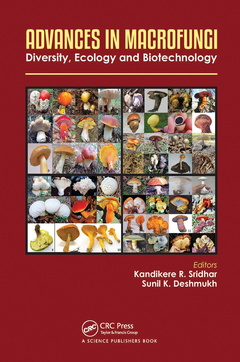Description
Advances in Macrofungi
Diversity, Ecology and Biotechnology
Progress in Mycological Research Series
Language: English
Subjects for Advances in Macrofungi:
Keywords
Agroecosystem; Functional foods; Nutraceuticals; Antioxidant potential; Mushrooms; Fruit Bodies; Nonconventional food; Ectomycorrhizal Fungi; Cantharellus Cibarius; Flammulina Velutipes; Mycorrhizal Fungi; DNA Barcoding; Medicinal Mushrooms; Macrofungal Species; Moisture Content; Ectomycorrhizal Fungal Communities; Amanita Rubescens; EcM Species; Ganoderma Lucidum; Boletus Edulis; Oyster Mushroom; Shiitake Mushroom; Lentinula Edodes; Ectomycorrhizal Fungal Species; FIPs; Sawdust Mixture; AgNPs Synthesized; Ganoderma Species; DNA Barcode Region; Arbuscular Mycorrhizae; AgNPs Formation
Publication date: 03-2021
· 15.6x23.4 cm · Paperback
Publication date: 03-2019
· 15.6x23.4 cm · Hardback
Description
/li>Contents
/li>Biography
/li>
Advances in Macrofungi: Diversity, Ecology and Biotechnology discusses the diversity and ecology of edible, toxic, medicinal and mycorrhizal macrofungi; the impact of ectomycorrhizal fungi in terrestrial ecosystems, ectomycorrhizal complex in Boreal forests and commercial application of Pseudotsuga in silviculture; the nutritional evaluation and cultivation of edible wild mushrooms; the diversity of novel metabolites of macrofungi useful in food, pharmaceutical and cosmeceutical industries; mushrooms as tool for eco-friendly synthesis of nanoparticles and proteomics of edible and medicinal mushrooms. In addition, it covers experimental designs, methodological approaches, biogeochemical cycles, conceptual/hypothetical models and life history strategies, linking mycorrhizal diversity to plant performance, chemotaxonomy, role of mycorrhizae in forestry and macrofungi in nanotechnology. It provides a valuable resource to graduate, post-graduate and researchers (in botany, microbiology, ecology, biotechnology, forestry, life sciences and environmental sciences) to understand the diversity, ecology, therapeutic value, mutualistic associations and biotechnological potential of macrofungi.
Part 1: Diversity and distribution. 1. Diversity and distribution of macrofungi. 2. Diversity and distribution of termitomycetes. 3. Diversity of coprophyllus macrofungi. 4. Diversity of Amanitas. 5. Taxonomic approaches to understand Entoloma. Part 2: Ecology. 6. Ecology of mycorrhizal fungi. 7. Ecology of termitomycetes. 8. Mycophagy in animals. 9. Aminatas in tropical region. 10. Substrate preference of macrofungi. Part 3: Nutraceuticals and metabolites. 11. Nutritional potential of edible wild mushroom. 12. Bioactive potential of edible wild mushroom. 13. Hallucinogenic macrofungi . 14. Degradation of lignocellulosic wastes. 15. Macrofungi in combating human ailments. Part 4: Association. 16. Mycorrhizal fungi in tree species. 17. Role of mycorrhizal fungi in forestry. 18. Association of mushrooms with termites. 19. Insect inhabiting macrofungi. 20. Tripartite association of macrofungi. Part 5: Cultivation and conservation. 21. Techniques of cultivation of mushrooms. 22. Methods of preservation of macrofungi. 23. Ex situ conservation of macrofungi. 24. In situ conservation of macrofungi. 25. Molecular approaches to conserve macrofungi
Kandikere R. Sridhar is Senior Professor in the Department of Biosciences, Mangalore University with 40 years of teaching and research experience and has a UGC-BSR Faculty Fellowship. His main area of research is ‘Diversity and Ecology of Fungi of the Western Ghats and Mangrove/Marine Habitats of the West Coast of India’. He was NSERC postdoctoral fellow/visiting professor in Mount Allison University, Canada; Helmholtz Centre for Environmental Research-UFZ and Martin Luther University, Germany and Center of Biology, University of Minho, Portugal. He was recipient of The Shome Memorial Award (2004) and has been Vice-President (2013) and President (2018) of the Mycological Society of India. He was also recipient of The Fellow of Indian Mycological Society, Kolkata (2014), Distinguished Asian Mycologist (2015) and Outstanding Leader in Education and Research, Association of Agricultural Technology of Southeast Asia (2016). He has over 300 publications and has edited four books.
Sunil K. Deshmukh is a Fellow and Area convener at the TERI-Deakin Nano-Biotechnology Research Centre, The Energy and Resources Institute (TERI), New Delhi, India and Adjunct Associate Professor, Deakin University Australia. He was Assistant Director (Natural Products) at the Piramal Enterprises Ltd., Mumbai and also served as Senior Research Scientist at the Hoechst Marion Roussel Ltd., Mumbai. He has broad industry experience in the field of applied microbiology. He is a fellow of the Mycological Society of India, Association of Biotechnology and Pharmacy and Society for Applied Biotechnology. He was the president of the Mycological Society of India (2017). He has over 100 publications and holds eight patents. He has also edited eight books on different aspects of mycology.

